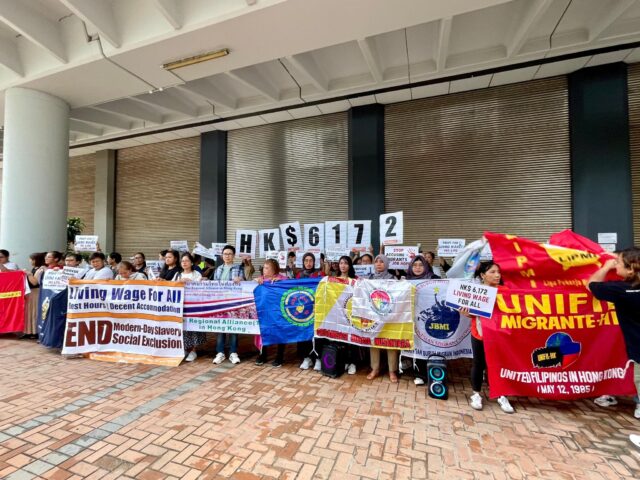Migrant domestic workers in Hong Kong pressed for fair wages and improved working conditions during a heated dialogue with the city’s Labour Department on Aug. 3, 2025, while others protested their exclusion from the talks, highlighting ongoing tensions over labor rights for the city’s 300,000-strong migrant workforce.
The Asian Migrants Coordinating Body (AMCB-IMA HKM), alongside representatives from various migrant organizations and NGOs, participated in the annual dialogue to review the Minimum Allowable Wage for migrant domestic workers (MDWs). Approximately 30 representatives attended the meeting, where they reiterated demands for a minimum wage of HK$6,172 (about $790 USD) and a monthly food allowance of HK$3,123, as outlined in the AMCB’s 2025 Living Wage Campaign.
Shiela Tebia Bonifacio, AMCB spokesperson, emphasized the urgency of these demands, noting they stem from the 2019 Living Wage Campaign, which uses the Oxfam formula to calculate a fair salary for live-in domestic workers. “Migrant domestic workers deserve a wage that reflects our value, not one that treats us as slaves,” Bonifacio said, underscoring the workers’ critical role in supporting Hong Kong families and the economy.
“Migrant domestic workers deserve a wage that reflects our value, not one that treats us as slaves,” – Shiela Tebia Bonifacio, AMCB spokesperson
The dialogue also saw calls for broader reforms. Dolores Balladares, chairperson of United Filipinos in HK, urged the Labour Department to include MDWs in the statutory minimum wage framework, arguing it would affirm their status as valued workers. Other demands included guaranteeing long-service pay after five years, regardless of contract renewal, and addressing inhumane working conditions.
JP of PILAR-Association of Indonesian workers pushed for regulated working hours, including an 11-hour continuous rest period between workdays, meal breaks, and the option for live-out arrangements to address substandard accommodations. Additional demands included clearer contract terms on working hours, rest periods, and suitable living conditions, as well as lifting the immigration entry ban on Nepali workers, ending accusations of “job-hopping,” and abolishing the two-week rule, which requires MDWs to leave Hong Kong within 14 days of contract termination.





Outside the Harbour Building, where the dialogue took place, a protest erupted as around 50 migrant organizations, barred from attending, voiced their frustration. The Labour Department cited limited venue space and time constraints as reasons for excluding these groups, a justification protesters dismissed as inadequate. “The department has the resources to find a larger venue or extend the dialogue,” said one organizer, who requested anonymity. The protest concluded with the submission of letters detailing the groups’ concerns and demands.
AMCB and its allies vowed to continue advocating for the rights of Hong Kong’s migrant domestic workers, who number over 300,000 and hail primarily from countries like the Philippines, Indonesia, and Nepal. “We will fight until the government hears us and ends modern-day slavery in Hong Kong,” Balladares declared.
The Labour Department has not yet responded to the demands or the protest, leaving uncertainty about whether the 2025 wage review will yield meaningful changes for the city’s migrant workforce.














